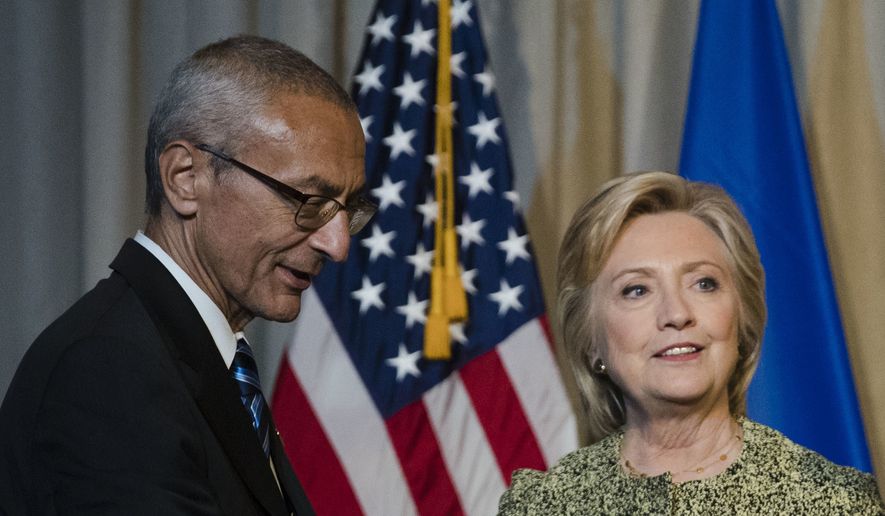Newly declassified House transcripts show that Hillary Clinton presidential campaign chairman John Podesta met with a former Senate Intelligence Committee aide who joined forces with dossier impresario Fusion GPS for the post-election phase of trying to dig up dirt on President Trump.
The ex-aide is Daniel Jones, who in 2017 formed the secretive nonprofit The Democracy Integrity Project. For the project, Mr. Jones hired Fusion GPS, the Clinton campaign’s opposition research firm.
During the election, Fusion co-founder Glenn Simpson took money from the Clinton campaign and the Democratic Party and retained Christopher Steele in June 2016. A former British intelligence officer, Mr. Steele went on to compile a dossier filled with felony allegations against Mr. Trump and aides that turned out to be bogus. Mr. Jones also hired Mr. Steele.
The House Permanent Select Committee on Intelligence’s final Russia election report revealed that Mr. Jones met with the FBI in March 2017, a month after he met with Mr. Podesta. He went to the FBI to brief them on his Trump findings and disclosed he had raised $50 million from Democratic donors to investigate the president and Russia.
Mr. Jones, who heads the Penn Quarter Group, said seven to 10 “wealthy donors,” primarily in New York and California, provided money to “continue exposing Russian interference in the 2016 U.S. presidential election. Mr. Jones’ plan was to share with Congress and the news media,” an FBI report said.
Last week, the House committee released more than 50 witness transcripts, including Mr. Podesta’s, from its 2017-2018 Russia investigation when Republicans, headed by Rep. Devin Nunes of California, were in control. Their report said there was no evidence of a Trump-Russia conspiracy. Special counsel Robert Mueller in March 2019 said his team failed to establish there was such a conspiracy.
As a witness, Mr. Podesta appeared twice, in the summer and late 2017. During his later testimony, Republicans asked Mr. Podesta to detail his interactions with Fusion GPS. In the campaign, Fusion had introduced Mr. Steele to a number of Washington reporters to persuade them to write of his allegations of an enormous Trump-Russia conspiracy.
A month after the Steele dossier was posted in full by BuzzFeed in January 2017, Mr. Podesta met with Mr. Simpson, Mr. Jones and Peter Fritsch, Fusion’s other co-founder.
“Dan Jones … was in the process of creating a nonprofit organization, as it were, to pursue the issues around Russian intervention in the U.S. election,” testified Mr. Podesta, one of Washington’s stalwart Democrats.
Mr. Podesta was President Barack Obama’s chief of staff and founded the liberal activist group Center for American Progress. He was also an election victim: The Russians hacked his personal Gmail account, and WikiLeaks released his messages.
Mr. Jones was a top aide to Sen. Dianne Feinstein, California Democrat, on the Senate Select Committee on Intelligence.
What exactly the four anti-Trump operatives discussed that day is not revealed in the transcript.
But in the Simpson-Fritsch book “Crime in Progress,” they say they reached out to Mr. Podesta to help raise money. They and Mr. Jones agreed to form the nonprofit Democracy Integrity Project.
While they billed the group as fighting Russian interference in U.S. democracy, Republicans say the group’s real target was always Mr. Trump.
Mr. Simpson and Mr. Fritsch wrote that big tech donors out West feared for their personal safety.
“With the Trump era not yet a month old, the fear of where he might take the country hung palpably over session after session,” they wrote. “A few potential donors, including some big names in the tech industry, begged off for reasons of personal safety.”
Republicans also note that the Simpson-Fritsch team promoted the dossier, one of the most discredited political documents ever created. They spread it to Congress, the news media and the FBI. Federal agents used the dossier’s inaccurate claims to win judges’ approval for four wiretaps. Mr. Steele’s main dossier source told the FBI he was just repeating Kremlin gossip.
In the three years since he met with the FBI, it is unclear what Mr. Jones has turned up.
It is known that Mr. Jones had a hand in at least one anti-Trump story that appeared in the New Yorker in October 2018.
The subject was one that had already gone around the block: Alfa Bank, Moscow’s largest and owned by Vladimir Putin associates, and the Trump Organization, supposedly maintained a secret line of communication via a dedicated computer server. The story’s prime promoter: Glenn Simpson.
Slate.com ran the first pre-election Alfa story on Oct. 31 under the headline, “Was a Trump Server Communicating with Russia?”
Two years later, the same allegation appeared in The New Yorker: “Was There a Connection Between a Russian Bank and the Trump Campaign?”
Mr. Jones and his assemblage of secretive cyber experts were prime sources for the story, which asked more questions than it answered.
“None of the independent experts I spoke to could be certain of what Alfa Bank and the Trump Organization were doing,” The New Yorker story reads. “Some of them cautioned that it was impossible even to guess at every way that an e-mail system might malfunction.”
A Trump Organization official told The Washington Times in 2017 that the root of suspicion lay with a cyber trail to a marketing spam dispenser outside Philadelphia. The source said that Alfa employees likely stayed at Trump lodgings and thus were included in a database of email promotion lists.
The New Yorker article concludes: “The enigma, for now, remains an enigma. The only people likely to finally resolve the question of Alfa Bank and the Trump Organization are federal investigators.”
More than a year before The New Yorker story ran, the FBI concluded in February 2017 that there was no Alfa-Trump computer hook-up, according to a Justice Department inspector general’s report.
• Rowan Scarborough can be reached at rscarborough@washingtontimes.com.




Please read our comment policy before commenting.